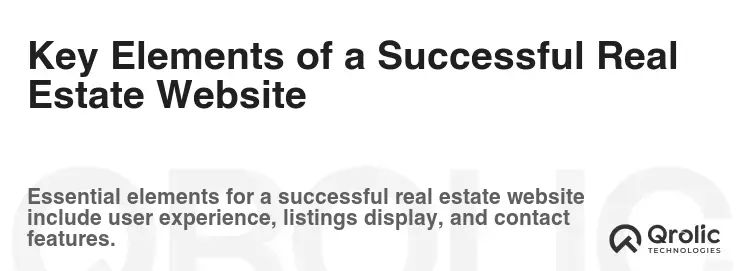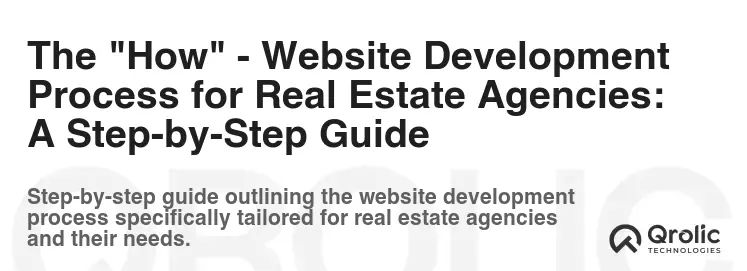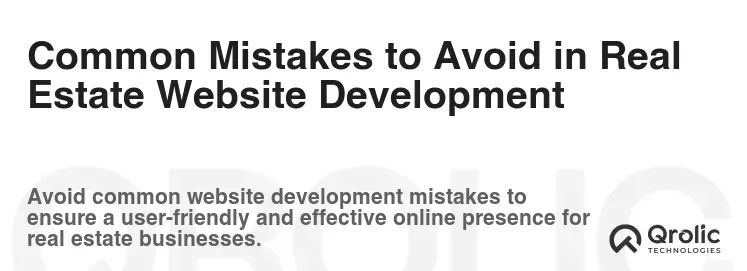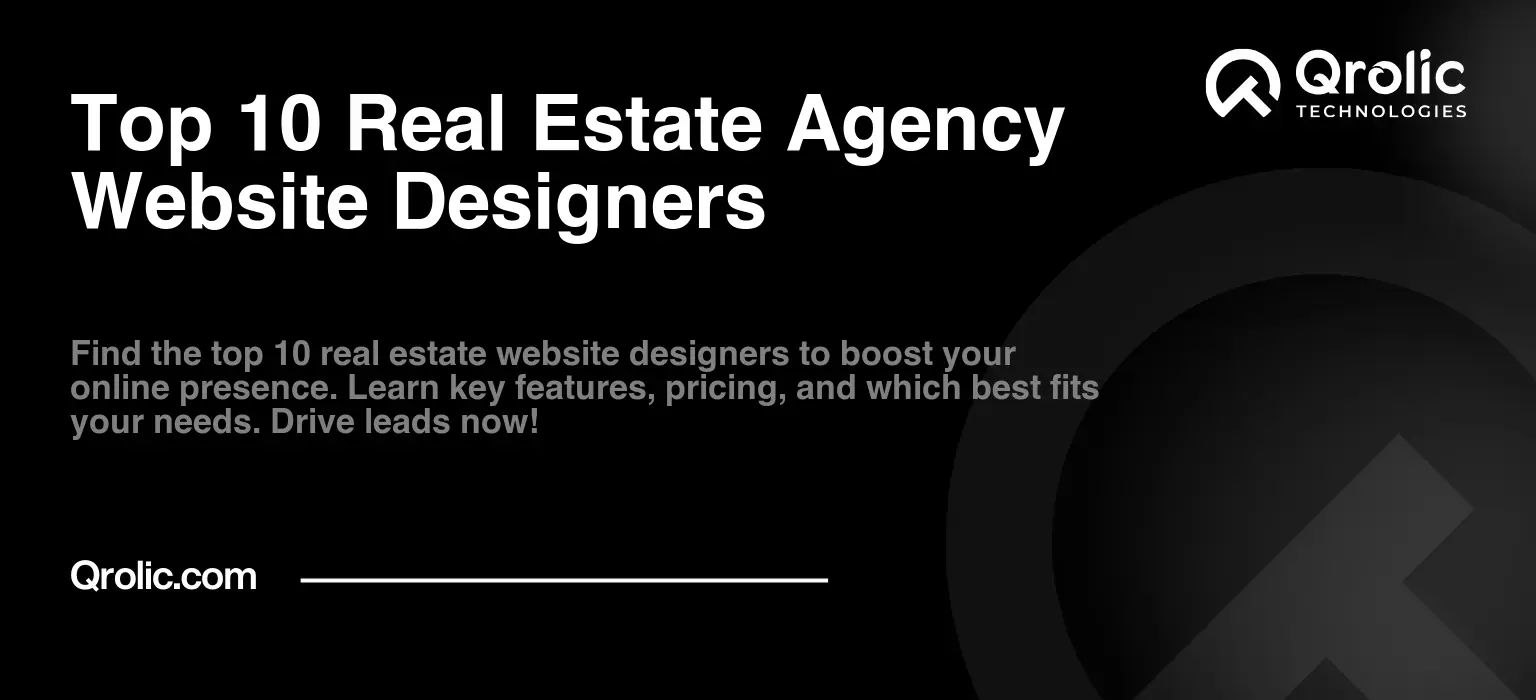The real estate market is a visual, emotional, and trust-based industry. Your website is often the first (and sometimes only) interaction potential clients have with your agency. It’s your digital storefront, your 24/7 salesperson, and the cornerstone of your online presence. A poorly designed or outdated website can send clients running to the competition. Conversely, a well-developed website can be your greatest asset, driving leads, building your brand, and establishing you as a leader in the local market.
This article will delve into the critical aspects of website development for real estate agencies, covering everything from initial planning to long-term maintenance. We’ll explore the “what,” “why,” “when,” and “how” of creating a website that not only looks good but also generates tangible results for your business. We’ll also touch upon specific design elements, SEO strategies, and mobile optimization tactics to ensure your website attracts, engages, and converts visitors into valuable clients. Whether you’re a seasoned broker or just starting, this guide provides actionable insights to help you build a powerful online presence.
Quick Summary:
- Your website is essential for leads and trust.
- Good design, listings, content, and SEO are vital.
- Plan, build, promote, and maintain your site.
Table of Contents
- Why a Strong Website is Essential for Real Estate Agencies
- Key Elements of a Successful Real Estate Website
- 1. Visually Appealing and User-Friendly Design
- 2. Comprehensive Property Listings
- 3. Valuable Content & Resources
- 4. Lead Capture & Conversion Optimization
- 5. Search Engine Optimization (SEO) for Real Estate
- The “How” – Website Development Process for Real Estate Agencies: A Step-by-Step Guide
- Step 1: Define Your Goals & Target Audience
- Step 2: Choose a Domain Name & Hosting Provider
- Step 3: Select a Website Platform (CMS)
- Step 4: Choose a Theme or Template
- Step 5: Install & Configure Your Website
- Step 6: Add Content & Property Listings
- Step 7: Implement SEO Strategies
- Step 8: Test & Launch Your Website
- Step 9: Promote Your Website
- Step 10: Monitor, Maintain & Update Your Website
- Common Mistakes to Avoid in Real Estate Website Development
- The Benefits of Professional Property Agency Web Design Services
- Qrolic Technologies: Your Partner in Real Estate Website Success
- Future Trends in Real Estate Website Development
- Conclusion: Investing in Your Digital Future
Why a Strong Website is Essential for Real Estate Agencies

In today’s digital landscape, a robust online presence is no longer optional for real estate agencies; it’s a necessity. Here’s why:
- First Impressions Matter: In the digital age, your website is often the first point of contact with potential clients. A professional, modern, and user-friendly website creates a positive first impression, conveying competence and trustworthiness. A clunky, outdated site, on the other hand, can deter potential clients and send them to competitors. The visual appeal, ease of navigation, and quality of information on your website directly impact a client’s perception of your agency.
- Lead Generation Powerhouse: Your website acts as a 24/7 lead generation machine. By strategically implementing contact forms, property search tools, and call-to-actions, you can capture valuable leads and nurture them through the sales funnel. A well-optimized website attracts organic traffic from search engines, driving qualified leads directly to your business.
- Showcasing Properties & Expertise: Your website is the perfect platform to showcase your property listings in their best light. High-quality photos, virtual tours, detailed descriptions, and interactive maps provide potential buyers with a comprehensive view of each property. Beyond listings, your website can also highlight your agency’s expertise through blog posts, market reports, and agent bios, establishing you as a trusted authority in the local real estate market.
- Building Brand Authority & Trust: A professional website reinforces your brand identity and builds trust with potential clients. Consistent branding, informative content, and client testimonials demonstrate your expertise and commitment to client satisfaction. A strong online presence positions you as a credible and reliable resource for real estate information and services.
- Competitive Advantage: In a competitive market, a standout website can differentiate you from the competition. By offering unique features, personalized experiences, and valuable resources, you can attract and retain clients who might otherwise choose a competitor. A well-designed website demonstrates your commitment to innovation and client service.
- Improved Customer Service: Your website can serve as a valuable resource for existing clients, providing access to important documents, answers to frequently asked questions, and updates on the market. This enhances customer service and fosters stronger relationships with your client base.
- Data and Analytics: Website analytics provide valuable insights into user behavior, allowing you to track traffic sources, identify popular pages, and optimize your website for better performance. This data-driven approach ensures that your website is constantly evolving to meet the needs of your target audience.
Key Elements of a Successful Real Estate Website

Creating a website that achieves the goals outlined above requires careful planning and execution. Here are some key elements to consider:
1. Visually Appealing and User-Friendly Design
- Clean and Modern Aesthetics: Opt for a clean, uncluttered design with a modern aesthetic. Avoid overly complex layouts or distracting animations. Focus on creating a visually appealing experience that is easy on the eyes.
- Intuitive Navigation: Make sure your website is easy to navigate. Use clear and concise menus, logical information architecture, and internal links to guide visitors to the information they need.
- High-Quality Imagery & Videos: Use professional-quality photos and videos to showcase your properties and your agency. High-resolution images and virtual tours can significantly enhance the user experience and attract potential buyers.
- Mobile Responsiveness: Ensure your website is fully responsive and adapts seamlessly to different screen sizes. Mobile browsing is increasingly prevalent, so a mobile-friendly website is essential for reaching a wider audience. This is also a critical factor for SEO ranking.
- Branding Consistency: Maintain consistent branding throughout your website, including your logo, color scheme, and typography. This reinforces your brand identity and creates a professional impression.
2. Comprehensive Property Listings
- Detailed Property Descriptions: Provide detailed and accurate descriptions of each property, highlighting key features and amenities. Use compelling language to engage potential buyers and paint a picture of the lifestyle the property offers.
- High-Resolution Photos & Virtual Tours: Include multiple high-resolution photos of each property, showcasing different angles and aspects of the interior and exterior. Consider adding virtual tours to allow potential buyers to explore the property remotely.
- Interactive Maps & Location Information: Embed interactive maps that show the property’s location and nearby amenities. Provide detailed information about the neighborhood, schools, and local attractions.
- Advanced Search Filters: Implement advanced search filters that allow users to easily find properties based on their specific criteria, such as price range, property type, location, and number of bedrooms.
- Featured Listings: Highlight your agency’s featured listings on the homepage or in a prominent section of the website to attract attention and drive traffic to these properties.
3. Valuable Content & Resources
- Blog Posts & Articles: Create informative blog posts and articles that cover topics relevant to the local real estate market, such as buying tips, selling strategies, and neighborhood guides. This can attract organic traffic and establish your agency as a trusted resource.
- Market Reports & Statistics: Publish regular market reports and statistics that provide insights into the local real estate market. This demonstrates your expertise and helps potential clients make informed decisions.
- Client Testimonials & Reviews: Showcase positive client testimonials and reviews to build trust and credibility. These testimonials provide social proof and demonstrate the value of your services.
- FAQs & Helpful Resources: Create a comprehensive FAQ section that answers common questions about the real estate process. Provide links to helpful resources, such as mortgage calculators and moving checklists.
- Agent Bios & Contact Information: Provide detailed bios for each agent, highlighting their experience, expertise, and areas of specialization. Include clear contact information, such as phone numbers, email addresses, and social media links.
4. Lead Capture & Conversion Optimization
- Contact Forms & Call-to-Actions: Strategically place contact forms and call-to-actions throughout your website to capture leads and encourage visitors to take the next step.
- Landing Pages: Create dedicated landing pages for specific properties or services, such as first-time home buyer programs or luxury property listings.
- Email Marketing Integration: Integrate your website with an email marketing platform to nurture leads and send targeted messages based on their interests and behavior.
- Chatbots & Live Chat: Implement chatbots or live chat to provide instant support and answer questions from potential clients.
- Analytics Tracking: Track key metrics, such as website traffic, bounce rate, and conversion rates, to identify areas for improvement and optimize your website for better performance.
5. Search Engine Optimization (SEO) for Real Estate
SEO is critical for driving organic traffic to your website and reaching potential clients who are actively searching for real estate services.
- Keyword Research: Conduct thorough keyword research to identify the terms and phrases that potential clients are using to search for properties and real estate services in your area. Focus on both broad keywords (e.g., “real estate agency”) and long-tail keywords (e.g., “luxury homes for sale in [city]”).
- On-Page Optimization: Optimize your website’s content, meta descriptions, and title tags with relevant keywords. Ensure that your website is well-structured and easy for search engines to crawl.
- Local SEO: Focus on local SEO to rank higher in local search results. Claim and optimize your Google My Business listing, and include your business name, address, and phone number (NAP) on your website.
- Content Marketing: Create high-quality, informative content that targets relevant keywords and attracts organic traffic. Blog posts, articles, and market reports are excellent ways to improve your SEO.
- Link Building: Build high-quality backlinks from other websites to increase your website’s authority and improve its search engine ranking. Guest blogging, directory submissions, and partnerships with other local businesses are effective link-building strategies.
The “How” – Website Development Process for Real Estate Agencies: A Step-by-Step Guide

Developing a successful real estate website involves a structured process, from initial planning to ongoing maintenance. Here’s a step-by-step guide:
Step 1: Define Your Goals & Target Audience
- Identify your primary goals: What do you want your website to achieve? (e.g., generate leads, showcase properties, build brand awareness)
- Define your target audience: Who are you trying to reach? (e.g., first-time homebuyers, luxury property buyers, investors)
- Analyze your competition: What are your competitors doing well? What are their weaknesses?
Step 2: Choose a Domain Name & Hosting Provider
- Select a memorable and relevant domain name: Ideally, your domain name should be easy to remember, spell, and type. Consider using your agency name or a keyword-rich phrase.
- Choose a reliable hosting provider: Select a hosting provider that offers fast loading speeds, reliable uptime, and excellent customer support. Consider options like shared hosting, VPS hosting, or dedicated hosting.
Step 3: Select a Website Platform (CMS)
- WordPress: WordPress is the most popular CMS for real estate websites, offering flexibility, scalability, and a wide range of plugins and themes.
- Other CMS Options: Consider other CMS options like Drupal, Joomla, or Squarespace, depending on your specific needs and technical expertise.
- Consider a Real Estate Specific Platform: Platforms like Placester or Real Geeks are built specifically for real estate agents, with built-in IDX integration and lead generation tools.
Step 4: Choose a Theme or Template
- Premium Themes: Invest in a premium WordPress theme designed specifically for real estate agencies. These themes typically offer advanced features, such as property search filters, virtual tour integration, and lead capture forms.
- Custom Design: If you have a unique brand identity or specific requirements, consider hiring a web designer to create a custom website design.
Step 5: Install & Configure Your Website
- Install your chosen CMS: Follow the instructions provided by your hosting provider to install WordPress or your chosen CMS.
- Install and configure your theme: Customize your theme to match your brand identity and configure the settings to meet your specific needs.
Step 6: Add Content & Property Listings
- Create engaging website content: Write compelling website content that showcases your agency’s expertise and provides valuable information to potential clients.
- Add property listings: Add your property listings to your website, including detailed descriptions, high-resolution photos, and virtual tours.
Step 7: Implement SEO Strategies
- Optimize your website for search engines: Implement the SEO strategies outlined above to improve your website’s visibility in search results.
Step 8: Test & Launch Your Website
- Test your website thoroughly: Before launching your website, test all of its features and functionality to ensure that everything is working correctly.
- Launch your website: Once you are satisfied with your website, launch it to the public.
Step 9: Promote Your Website
- Promote your website online: Promote your website through social media, email marketing, and online advertising.
- Promote your website offline: Promote your website offline through print advertising, networking events, and community outreach.
Step 10: Monitor, Maintain & Update Your Website
- Monitor your website’s performance: Track key metrics, such as website traffic, bounce rate, and conversion rates, to identify areas for improvement.
- Maintain your website: Regularly update your website’s content, plugins, and themes to ensure that it is secure and functioning properly.
- Update your website with fresh content: Regularly add new content to your website to keep it fresh and engaging.
Common Mistakes to Avoid in Real Estate Website Development

- Poor Mobile Responsiveness: Neglecting mobile optimization is a major mistake, as a significant portion of online users browse on mobile devices.
- Slow Loading Speeds: Slow loading speeds can frustrate visitors and negatively impact your search engine ranking.
- Lack of Clear Call-to-Actions: Not including clear call-to-actions can prevent visitors from taking the desired action, such as contacting you or scheduling a showing.
- Ignoring SEO Best Practices: Failing to optimize your website for search engines can limit your organic reach and make it difficult for potential clients to find you online.
- Outdated or Inaccurate Information: Providing outdated or inaccurate information can damage your credibility and deter potential clients.
- Complicated Navigation: Having a complicated navigation structure can frustrate visitors and make it difficult for them to find what they’re looking for.
- Neglecting Security: Ignoring website security can leave your website vulnerable to hacking and malware.
The Benefits of Professional Property Agency Web Design Services

While it’s possible to build a basic website yourself using readily available platforms, engaging professional property agency web design services offers significant advantages:
- Expertise & Experience: Professional web designers have the expertise and experience to create a website that is both visually appealing and highly functional. They understand the latest design trends and SEO best practices.
- Customization & Branding: Professional designers can create a custom website design that reflects your unique brand identity and differentiates you from the competition.
- SEO Optimization: Professional SEO experts can optimize your website for search engines, improving its visibility and driving organic traffic.
- Time Savings: Building a website can be time-consuming, especially if you lack the necessary technical skills. Hiring professionals frees up your time to focus on other aspects of your business.
- Ongoing Support & Maintenance: Many web design agencies offer ongoing support and maintenance services, ensuring that your website remains secure and functioning properly.
Qrolic Technologies: Your Partner in Real Estate Website Success

At Qrolic Technologies (https://qrolic.com/), we understand the unique challenges and opportunities in the real estate industry. We specialize in creating custom website solutions that are designed to help real estate agencies attract leads, showcase properties, and build their brand.
Here’s how Qrolic Technologies can help your real estate agency:
- Custom Web Design & Development: We create custom website designs that reflect your brand identity and are optimized for user experience and lead generation.
- IDX Integration: We integrate your website with your local Multiple Listing Service (MLS) to provide up-to-date property listings.
- SEO Optimization: We optimize your website for search engines to improve its visibility and drive organic traffic.
- Mobile Responsiveness: We ensure that your website is fully responsive and adapts seamlessly to different screen sizes.
- Content Management System (CMS): We use popular CMS platforms like WordPress to give you control over your website content.
- Ongoing Support & Maintenance: We provide ongoing support and maintenance services to ensure that your website remains secure and functioning properly.
We understand that every real estate agency is different. That’s why we take a collaborative approach to website development, working closely with you to understand your specific needs and goals. We’re committed to providing you with a website that not only looks great but also delivers real results for your business. Contact us today to learn more about how Qrolic Technologies can help you build a successful online presence.
Future Trends in Real Estate Website Development

The real estate industry is constantly evolving, and website development is no exception. Here are some future trends to watch:
- Artificial Intelligence (AI): AI-powered chatbots and virtual assistants will become increasingly common on real estate websites, providing instant support and personalized recommendations to potential clients.
- Virtual Reality (VR) & Augmented Reality (AR): VR and AR technologies will provide immersive virtual tours of properties, allowing potential buyers to experience properties remotely.
- Personalization: Websites will become more personalized, tailoring content and recommendations to individual user preferences and behavior.
- Video Marketing: Video marketing will continue to grow in importance, with more real estate agencies using video to showcase properties, agent bios, and market updates.
- Voice Search Optimization: Websites will need to be optimized for voice search as more users rely on voice assistants like Siri and Alexa to find information online.
- Blockchain Technology: Blockchain technology may be used to streamline real estate transactions and improve security.
Conclusion: Investing in Your Digital Future

Your website is a critical investment in the future of your real estate agency. By creating a visually appealing, user-friendly, and SEO-optimized website, you can attract leads, showcase properties, build your brand, and establish yourself as a leader in the local market. Whether you choose to build your website yourself or hire a professional agency like Qrolic Technologies, taking the time to create a strong online presence is essential for success in today’s competitive real estate landscape. The right realtor website services can transform your business. Your website is more than just a digital brochure; it’s the foundation upon which you build trust, generate leads, and secure your place in the dynamic world of real estate.









